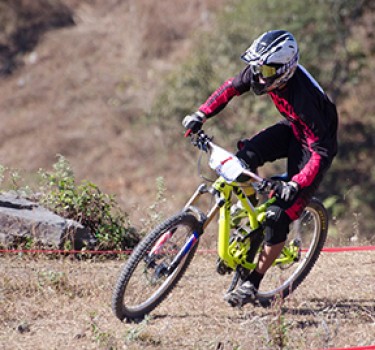
Your experience on this site will be improved by allowing cookies.
Read our Privacy Policy

Everest Base Camp is a classic trek through the Khumbu Valley and Sherpa village offering more than just a walking holiday. For many, it is a pilgrimage to the highest mountain in the world, for others once in a lifetime experience. This 17-days trekking to Everest base camp is your chance to make these dreams come true, to challenge yourself and discover both the majesty of the mountains and your own potential.
We have carefully devised our itinerary with a number of rest days at Namche Bazaar and Dingboche to give you an opportunity to explore Synboche, Khumjung village and Chhukung Ri. This offers an exceptional way to acclimatize safely on your Everest journey. A slow ascent through wonderful Sherpa villages, Suspension bridges, Waterfalls, Chortens, Mani walls, rugged mountains, alpine lakes, glacial plains, frothy rivers and picturesque valleys covered in pink blossoms allows you time to enjoy the scenery, wildlife and visit a number of monasteries.
Our final goal is Everest Base Camp on the Khumbu Glacier and the opportunity to climb Kala Pattar (5545m), a viewpoint recognized as the best vantage point to see the breathtaking views of the highest mountain on earth.
Upon arrival in Kathmandu, we explore Temples, Stupa and the old Bazaar of Kathmandu valley listed on UNESCO world heritage sites before taking breathtaking flight to Lukla and start our dream trekking holidays to the base of highest mountain in the World. After completing the trek, we will again have 2 nights in Kathmandu for safety reason, last shopping and to explore more places before flying back home with a memory which last with you forever.
Joining Arrangements & Transfers
All Clients travelling to Kathmandu will be met at the airport by a TTG representative who will arrange the transfer to the group hotel. Please look our logo at the arrival gate.
Accommodation in Everest base camp trek
While in Kathmandu the group will stay in a mentioned hotel or hotels with similar categories as on the Everest base camp trek itinerary. We choose hotels not to far from the main downtown. Most of our hotels will be in central Thamel so that you can shop, eat and go anywhere easily.
Whilst on Everest Base Camp trek we spent in lodges/tea houses. The Nepalese trekking lodges also known as 'tea-houses are simple, friendly and atmospheric. As they are far from the nearest road is it not surprising that they are simple establishments as everything must be carried up by porters or animals. Most of these lodges have heated dining areas which are often attractively decorated. Bedrooms tend to be quite basic and are unheated with wooden beds and foam mattress. You will need a sleeping bag. The lodges have shared washing and toilet facilities. Some lodges have solar powered showers (charged at $5 per shower) and battery charging facilities (also charged at a rate per hour 1-2$). Staying at the lodges is a great way to meet fellow hikers and the locals around the Everest region. Most accommodation is arranged on a twin sharing basis and if you are travelling by yourself you will room with another single traveller of the same sex. Please note, however, that at several of the places we stay near the passes, there is a limited choice of accommodation and some of the lodges we use will have only multi-bedded rooms. Where this is the case, the group will be split amongst the available rooms and this could be unsegregated male/female. Hotel nights in Kathmandu single rooms are available for a supplementary cost. On the Everest Base Camp trek only sharing rooms.
Solo Travellers
Our group trips are designed for shared accommodation and we do not charge a single supplement. We believe single travellers should not have to pay more to travel. Single travellers joining group for Everest trek are paired in twin or multi-share accommodation with someone of the same sex for the entire trip. If you prefer to have your own single room then you have to pay single supplement, however the single room is only possible in Kathmandu not on the trekking.
Flight from Ramechhap
Flights to and from Lukla may be operated out of Ramechhap Airport, in an effort to alleviate congestion at Kathmandu’s Tribhuvan International Airport by the Civil Aviation Authority of Nepal for the Everest region trek. In such case, any departures affected will need to wake up quite early on day 3 to drive the 130 kilometres (approximately 5-hours) from Kathmandu to Ramechhap Airport. A private vehicle transfers will be provided at no additional cost. Your local leader will give you the most up to date information regarding delays to flights on the spot.
Alternative itinerary during flight cancellation
Weather conditions in the Himalayas can change rapidly, which can result in the need for changes to be made to our intended itineraries. Flights throughout Nepal – particularly in high mountain areas – are often delayed or cancelled due to poor weather conditions. Flights between Kathmandu and Lukla are particularly prone to these delays which has the potential to vary the itinerary of our tour departures. Our contingency plans in case of bad weather preventing the fixed wing aircraft flight from Kathmandu to Lukla are as follows:
Day 3 – We will attempt to board our booked fixed-wing plane as per the itinerary. If this flight is cancelled, we will return to our hotel in Kathmandu for an additional night.
Day 4 – We will again attempt to board our booked fixed-wing plane. If this flight is cancelled we will endeavour to charter a helicopter to transport the group, provided helicopters are available and weather does not prevent them from flying to Lukla.
Travellers will need to use their emergency fund to cover the cost of the chartered helicopter. The exact cost will depend on how many travellers are in your group and could be up to US 500. If we reach Lukla on day 4 by either fixed wing aircraft or helicopter we will then follow the same itinerary to Everest Base Camp but descend over one less day in order to take our return flight from Lukla on day 15.
Food on Everest base camp trek
Typical meals provided in the Everest region lodges will include some Nepali dishes and some international cuisine from pizza and chips. However as a responsible tour operator we encourage you to eat local food whenever possible because this will help the local economic and these local foods are always fresh.
We order meals in advance and the Everest trekking leader will suggest you what is safe and good to eat there. Breakfast will usually be porridge, eggs, bread, lunch will be a simple meal with a like noodle, rice, and dinner will be 2 courses consisting of soup, main meal. All drinks, desert & beverages are extra. In Kathmandu breakfast is included. If you are vegetarian is great if not we still recommend you to stay vegetarian during the Everest Base camp trek.
A Typical Day in Everest base camp hiking
Shortly after first light you should wake and start packing your kitbag and making preparations for the day. Coming down to the dining room we will be served breakfast from the lodge kitchen before setting off on the day’s trek. We will generally reach our lunch stop by mid-day after around 3 or 4 hours of the Everest Base Camp trek. Lunch is taken at tea houses along the Everest route. This is normally a leisurely affair and is a great time for relaxing, reading and sitting in the sun. Our porters usually catch up with the group during lunch and then are well on their way to the evening’s stop by the time we set off again. It is usual for the afternoon’s walk to be shorter than the morning session. On arrival at the lodge, the trekking leader will organise everyone’s room. After checking in to your room you may wish to relax with a beer on the terrace of your lodge before taking dinner. Dinner is taken in the dining room which normally has some form of heating. This is a great time of day for reliving the events of the trek so far and for general socialising. By 9.00pm most trekkers will have retired to bed and by 10 pm the whole lodge will be asleep.
Group Leader & Support Staff
The group will be led by an experienced English-speaking local leader, and on Base Camp trek will have the services of porters to carry luggage.
Spending Money
Approximately US$500-600 (or equivalent Australian dollars, Euros etc.) changed into local currency, should be sufficient for miscellaneous personal expenses including tips for guide/porters, drinks & meals in the city. It is not necessary to obtain local currency (Nepali rupees) prior to departure. Sterling, US Dollars and Euros are equally acceptable for exchange in Nepal. We recommend that you carry your travel money in the form of cash since you will exchange the majority of this on the day of your arrival in Kathmandu. If you prefer not to carry all of your spending money in cash, it is possible to withdraw money (rupees only) from ATMs in Kathmandu using your debit or credit card. During the Everest Base camp trek, it is possible to buy snacks, chocolate, tea, coffee, soft drinks and beer on most days. Please be aware that since everything has to be carried up, these items become more expensive as you gain altitude.
Guidance on Tipping
Tipping is the accepted way of saying ‘thank you' for good service. Tips do not form part of the wages of your guides, porters, and trek crew but they are very much appreciated. It is important to remember that tipping is voluntary and should be dependent on good service. Normally the tips are given at the end of the EBC trek and this is best done as a group rather than from individuals. Most groups will give the tips with a bit of ceremony (or sometimes a party) on the last evening, to mark the end of the trip. The level of tipping should be determined by the group as a whole with everyone contributing an equal amount that all are comfortable with. As a rough guide, we recommend about 10% of your trip. At the end of the trek, many people also like to donate various items of their equipment to the porters and trek staff who work so hard to make the trip a success. Boots, gloves, hats, scarves and even socks (clean of course) are always warmly received by the porters. Technical clothing and equipment such as head-torches and trekking poles are highly prized by the Sherpa crews. If you think you would like to donate equipment at the end of your trip, your local trip leader will make arrangements for a fair distribution among the trek crew.
Baggage Allowance
Your baggage on the Everest Base Camp trek will be carried by porters. The packed weight of your trek bag whilst trekking should be no more than 13kg. It is possible to leave clothes or other items not required on the trek at the hotel in Kathmandu or Pokhara.
Altitude in Everest base camp trek
This holiday involves going to high altitudes. During the course of your Everest trip, you will reach altitudes in excess of 5500m meters. This is not something that you should worry about; the human body is quite capable of adapting to a very wide range of altitudes, but it is important that we follow some simple rules in order to acclimatize successfully. When we plan an itinerary, we consider this very carefully and plan our holiday.
Here you can find further information about Altitude Sickness.
Gear List for Everest base camp trek
The following gear checklist should help you with your packing. As a general rule, you should always try to keep the weight of your equipment to a minimum.
The packed weight of your trek bag while Everest Base Camp trekking should be no more than 13 kgs.
You must bring the following gears during EBC trek:
The following items are optional:
Find more details about Equipment Checklist.
Notes
The Nepalese are still traditional and conservative in the way they dress. Therefore to avoid embarrassment on both sides we recommend that you respect this and do not wear revealing clothing or sleeveless tops while visiting Nepal. Shorts are acceptable, but they should reach to just above the knee and be modest and for women, it is preferable to wear trousers or a long skirt.
Passport & Visas
A passport with 6 months remaining validity at the end of your stay is generally required. Please check the relevant embassy or consulate for other nationalities. It is your responsibility to ensure that you have the correct travel documents and visas for your Everest holiday. Visa requirements and charges are subject to change without notice. If you are travelling outside the EU you should have at least 2 blank pages in your passport for each country that you visit.
All nationalities require a visa. The visa fee in Nepal is $25 for 15 days, $40 for 30 days, $100 for 90 days, and is obtainable on arrival. Payment must be made in cash and USD, GBP, or Euros are accepted. Please bring 4 passport size photos for different permits.
Trekking Permits – what do we need from you?
We need your passport copy by email as soon as you confirm the Everest trip. We also need 3 passport-style photographs of yourself. Please make sure you bring the photographs with you.
Health & Vaccinations
You should contact your doctor or travel clinic to check whether you require any specific vaccinations or other preventive measures. You should be up to date with routine courses and boosters as recommended in the UK e.g. diphtheria-tetanus-polio and measles-mumps-rubella, along with hepatitis A and typhoid. Malarial prophylaxis is not usually required for trips in the mountains however, if you are visiting rural and remote low-lying areas then they might be necessary. On holidays to more remote areas, you should also have a dentist check-up.
Know more about how you can stay healthy in Nepal: Staying Healthy in Nepal.
Currency
The unit of currency in Nepal is the Nepalese Rupee. We can change this money in Kathmandu which has a better rate than hotels and Airports. Guides will show you the place after arrival.
Electricity Supply & Plug
We recommend you check if you require an adaptor for your electrical items at Plugs and Sockets
Preparing For Your Everest trek
It makes a lot of sense to spend some time before coming on the trekking holiday, getting some additional exercise. The fitter you are, after all, the more enjoyable you will find the experience. We suggest that you adopt a weekly exercise regime leading up to your trip. Regular hiking in the hill country is the best training but jogging, squash and swimming are also good for developing cardiovascular fitness and stamina. Note that you will encounter a lot of steps on the Everest trail while ascending and you might wish to tailor your exercise to take this into account. Whatever your preparation you should make time to spend at least a few days prior to your trip making long walks in a hilly country. It is also a good idea to do some reading about the country and the culture of the local people before you embark on an Everest holiday. You can explore our blog page and read Everest base camp trek: a complete beginner guide, on which we have tried to give most of the information you need to know before planning for Everest base camp trek.
Climate in Everest region
October to November and March to May are the best times for the Everest Base Camp trek in Nepal. These months either side of the summer monsoon season are neither too hot in the foothills nor too cold in the higher elevations and they offer the best conditions for trekking. Pre-monsoon is the best time to see the colourful blooms of the rhododendron at lower elevations. The post-monsoon months usually offer the clearest skies and the most settled weather. At either of these periods you will encounter a wide range of daytime temperatures during your Everest trip from approximately 25ºC in Kathmandu to approximately 14ºC at 3000 metres, and approximately -1ºC at Everest Base Camp. The ‘real feel’ temperature in the middle of the day will be much warmer than this but at night in the rarefied air the temperatures plummet and you can expect to experience overnight temperatures below freezing anywhere above 3000 metres. In the Everest Base Camp, Chola pass - the nighttime temperatures may reach –10ºC or exceptionally, below this. Extended periods of rain or snow are very unlikely outside of the monsoon period but short-lived storms can and do occur.
Books
Maps
Everest Base Camp. 1:50,000. Nepal Maps
A good scale map with contour interval at 40 meters. This is the definitive map for the Everest Base Camp trek.
Booking is already opened for year 2023 and 2024.
Not to forget?!
Please do not forget to come with a positive attitude, flexibility, a sense of humor and appetite of adventure and discovery!
What Lonely Planet said about us: “Long-established trekking company with a breadth of experience and an easy-to-find location.”
What Rough Guide said about us: "A very reliable, super friendly agency offering top-notch service.”
What Stefan Loose said about us: “Ein Absolut verlässlicher, superfreundlisher veranstalter mit erstlkassigem Service.”
What Petit Futé said about us: “une agence engagée avec une belle expertise du terrain.”
The Following dates and prices are LAND ONLY itinerary joining in Kathmandu. Please make your own flight arrangements. If you need some help to arrange an international flight, we can suggest you some agents who are specialized on ticketing.
BOOK WITH CONFIDENCE - No surcharge guarantee whether you are booking for this year or the next, we have undertaken to guarantee that all of our Land Only prices will not change once you have booked your holiday.
DATE WITH FESTIVAL & EVENTS - recommended If you are planning your holiday and want to have once in a life time experience then chose the date that combined with events or festivals. It will enhance an experience of life time in your holiday.
Our Tours Status Index...
 You can Book
You can Book
 Guarantee Departure
Guarantee Departure
 Limited Seat
Limited Seat
 Closed Tour
Closed Tour
| Trip End Date | Single Supplement | Price | |||
|---|---|---|---|---|---|
You can also use this tour as a base for a tailor-made itinerary. Like your personal architect creating your one-of- a-kind home, our Travel Specialists will execute the trip of a lifetime. It's all up to you - logistics, pace, budget, dates, performances, visits, explorations, meals and lodging are hammered out down to the finest customized detail. Please fill in our tailor-made request form.
If you do not want to join a group then you can also make this a private trip with your friends and family one at your own schedule. Considering this, Trekking Team Group organizes private journeys as well. Please choose your own departure date.
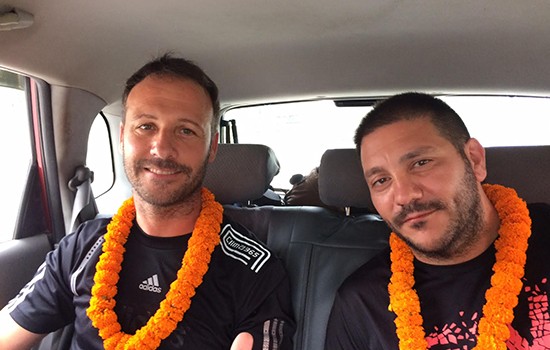
Arrival at Tribhuwan International Airport, Kathmandu. Traditional welcome by our airport representative. Your guide briefs about your further programme. Typical Nepali dinner served in the evening with culture program.
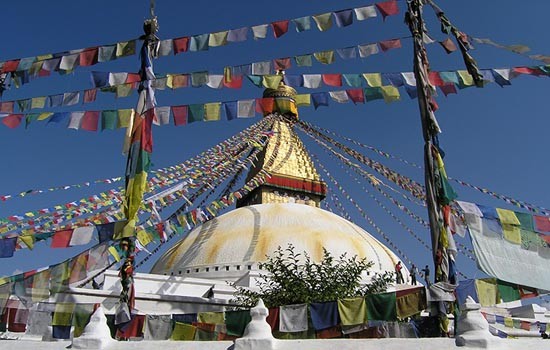
You will be taken for sightseeing of Kathmandu Valley to explore the vibrant city after breakfast at your hotel. Drive to famous Buddhist Stupa Swayambunath, also known as Monkey temple, on the hill of Kathmandu Valley where you can see stunning view of mountains and Kathmandu valley. This temple attracts Buddhists and tourists from around the world. Swayambhunath Stupa is the most ancient and enigmatic of all the holy shrines in Kathmandu valley. Its lofty white dome and glittering golden spire are visible from far and wide. Next is Pashupatinath, the temple of Lord Shiva. This is probably the most famous temple for Hindu in Indian Sub-continent. There is crematorium beside the temple where dead bodies are burnt to ashes. After exploring Pashupatinath you will visit fascinating sights of Patan Durbar Square, one of the most glorious examples of traditional Nepalese architecture, full of centuries old temples and palaces.
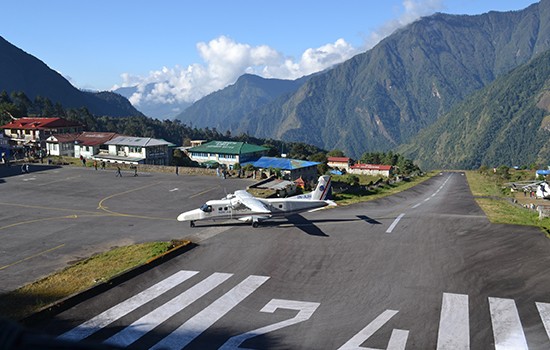
You will take stunning flight to Lukla from Kathmandu. You will meet with the trekking crew upon arrival. Following a short tea break you will trek northwards up to the valley of Dudhkoshi. Descend from the small plateau into the forested valley. The trek is very easy and short today. However, the difference in altitude, in comparison with Kathmandu, can make you feel a bit difficult. After lunch you trek north towards Phakding. The trail crosses several streams and you finally reach to Phakding (2650m). You will spend your first night in this settlement from where you will have tantalizing views.
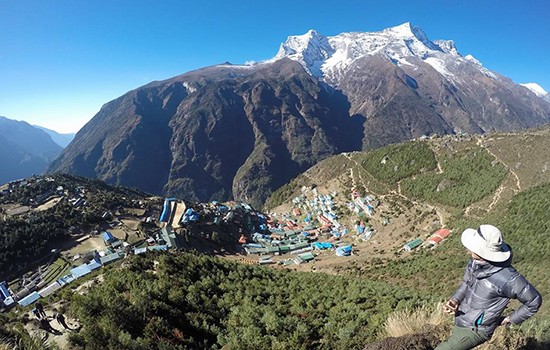
Hike to Namche Bazaar through farmland and settlements. You will follow the Dudh Kosi northwards. This day walk takes you through magnificent forests of rhododendron, giant fir and magnolia trees. You will cross the west fork of the river, the Bhote Kosi, and start the steep climb to Namche Bazaar. Namche is the largest Sherpa village which is called as gateway to Mount Everest. Namche is a prosperous Sherpa village and an important trading center as well. Locals from various villages gather during the weekly bazaar and sell fresh foodstuffs.
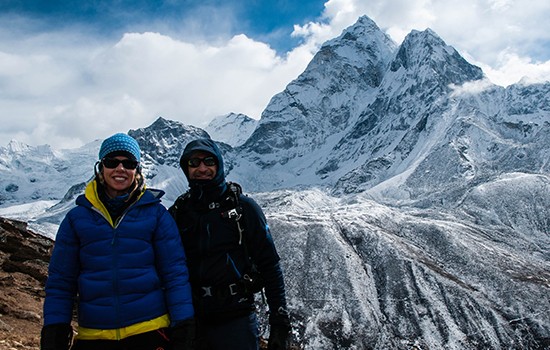
You will take rest in Namcha and explore the village Thamo or Synboche. Make yourself fit, physically and mentally, for the further journey. This day is for acclimatisation. We suggest you to stay active even in the rest day so that it will help you for the further trekking.
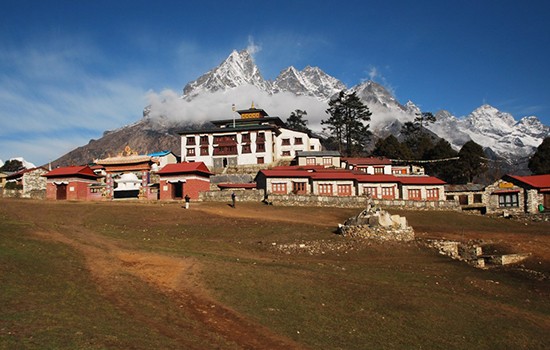
The route from Namche to Tengboche is unbelievably beautiful – the Dudh Kosi is far below and Thamserku, Kantega, Ama Dablam, Lhotse and Everest rise in the front. This lovely walk is full of woods, rhododendron forests, mani walls, chorten (stupas), and suspension bridges across the river.
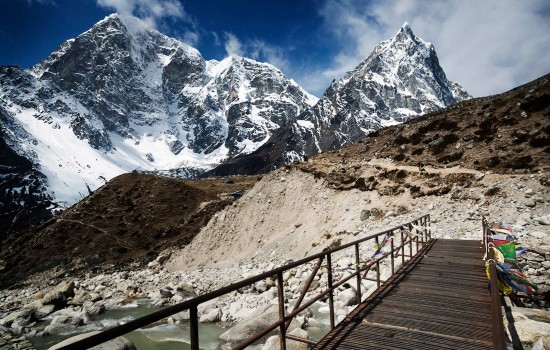
After breakfast visit the beautiful Tenboche Monastery. Hear the story of Yeti from Lama and if possible see the praying. After this descend to a lodge in Debuche. After lunch trek to Dingboche. The trek is very beautiful. It is one of the most beautiful valley walks in the earth. Overnight in Dingbuche.

This is an acclimatization day. An acclimatization day here can be used to hike up the Imja Khola to Nangkartshang Peak, a small summer settlement from where stunning views of Island Peak, Lhotse, Ama Dablam and the fluted ice walls flanking the Amphu Lapcha pass can be seen. Make fit yourself for the further journey. Physiologically prepare yourself for adaptation to changes in climate or environment. We recommend you to stay active even in a rest day as it is better than being idle while on a trekking journey.
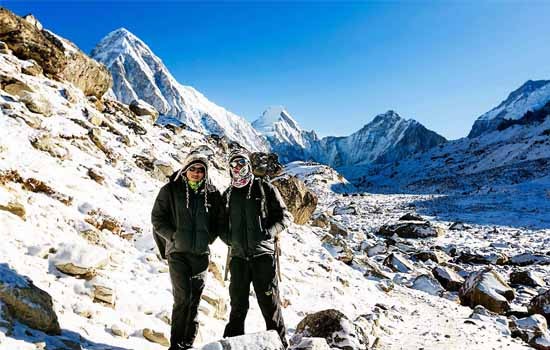
The ascent towards Everest Base Camp continues through alpine meadows and summer yak pastures towards the end of the moraine of the Khumbu Glacier. It is a steep, tough climb towards the village of Gorak Shep. Trek continues towards Lobuche where the view is straight towards Nuptse and the sunset is truly magnificent.
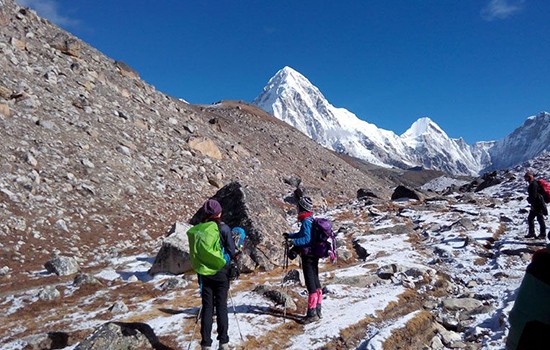
The higher altitude makes this day's trekking quite challenging. Trekking from Lobuche to Gorak Shep is very challenging. You will climb Khumbu Glacier and cross the Changri Glacier to Gorak Shep. The views are really stunning. Overnight in Gorak Sheep.
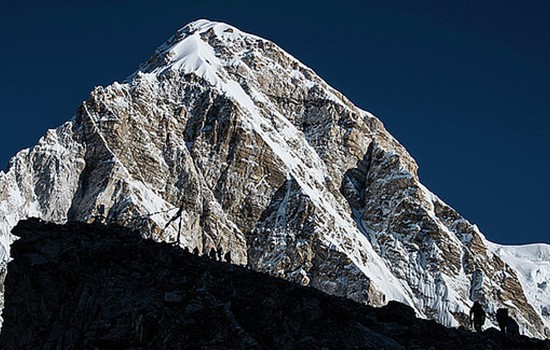
Your condition will be checked today before you move on. If the condition is found good then hike to Kala Patthar. Enjoy an early morning hike to an excellent viewpoint of the Everest region, with panoramic vistas of the front of Mt. Everest and Pomo-Ri. Kala Patthar is a notable landmark located on the south ridge of Pumori. The ascent of Kala Patthar begins at Gorakshep, the original base camp for Mt.Everest. Back to hotel for breakfast and trek down to Pheriche.
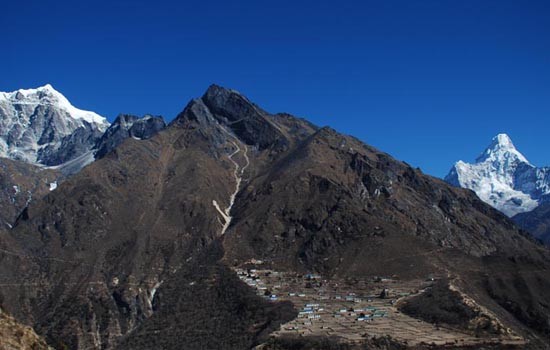
Today’s trail is not too much up and down, following a gradual ascent through a forest to the Phortse. This is the beautiful remote village in Khumbu region with spectacular mountain scenery. Meet with the local people and chat with them if you like. The trek is about 5-6 hours today.
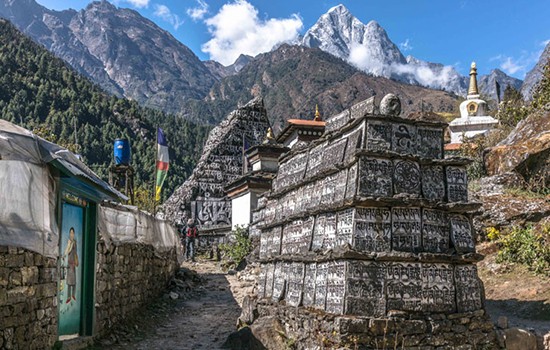
After breakfast trek around one and half hour up to the Khumjung, at the foot of the sacred Khumbi Yul Lha. The village of Khumjung is situated near the peak of Khumbila, from which this region is named. The local monastery is well known for housing what is purported to be the scalp of the infamous Yeti. You will leave Khumjung passing through the school where Sir Edmund Hillary raised funds. His legacy and the great work he started here still continue. You will head towards Namche where you’ll spend a few hours before we leave for Monjo. As you reach the peak of the mountain you are destined with spectacular views of Namche from above. There is a very distinct tree line that you notice as you trek through the mountains. As you descend landscape continues to become greener. Beautiful waterfalls and streams are common as you walk down.
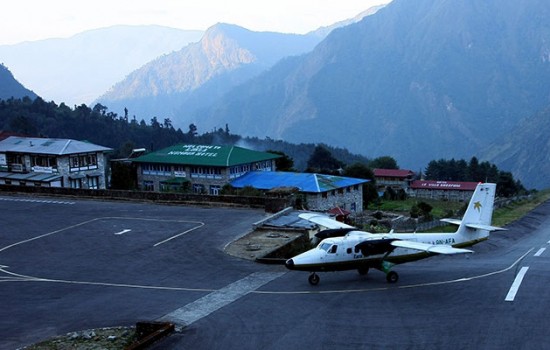
Hike down a steep trail to the Dudh Kosi river. You’ll have a long and leisurely trek back to Lukla. Celebrate your trek at a local tea house and gaze back at the jagged peaks of the mountain you’ve enjoyed. Bid adieu tonight to your trekking crew.
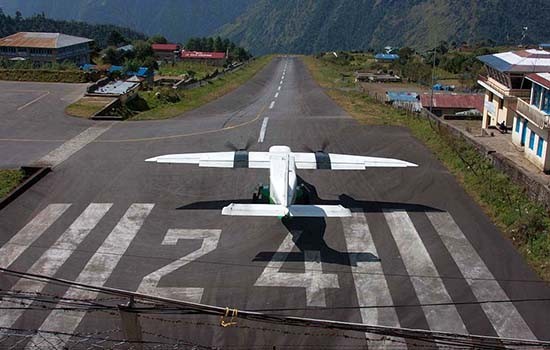
Fly from Lukla to Kathmandu. Enjoy panoramic mountain views and spend the rest of the day sightseeing, exploring, shopping or just relaxing in Kathmandu’s numerous cafés and roof-top restaurants by your own.
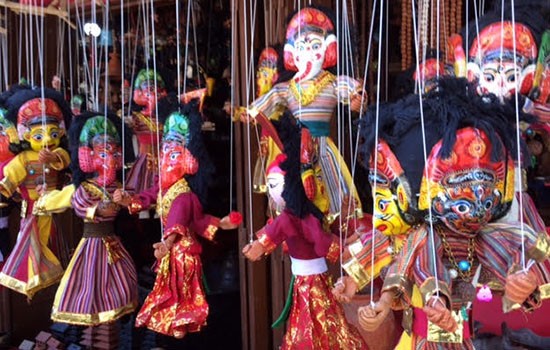
It’s a leisure time in Kathmandu, where the rest of the day is free for shopping, sightseeing or relaxing. This is an extra day in case of bad weather. Free time to explore Kathmandu before setting for the airport.
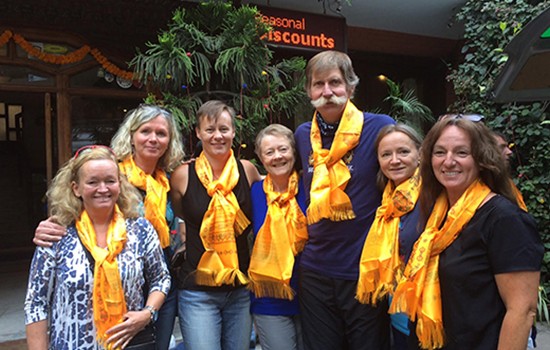
Your final day in Kathmandu is a free day. You do as you like. Many people take the time for shopping others enjoy exploring the cultural sites of the city. Our local guide can advise you on the best shops in the area. Farewells! Our airport representative will travel with you to the airport.
Mar 14 2023
I've now done two treks with Trekking Team and they have been really amazing. They professionally organized and scheduled a great plan for my level of fitness and my availability, and the guides were very knowledgeable, safety conscious, helpful, and really fun to trek with! They really took care of everything, not just the trek itself. They made it really easy to get into nepal, get around in kathmandu, go sightseeing, shop for the best gear, find good food, follow the local custom and understand the culture, and they chose great hotels to stay at as well.
I'll definitely go with them again for my next trek!
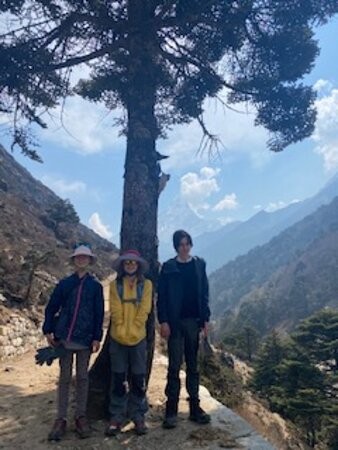
May 14 2021
What an amazing trek in the mountains with Trekking Team Group! we are a family of 5 and Shreehari, Ram, Dhawa and Chandra took such wonderful care of us. we have 3 youngish children (ages 13, 11 and 11) and they brought us such a memorable family experience that had a safety focus which we appreciated. Ram was a patient and informative guide, showing us the wonders of the trek from Lukla to Everest Base Camp and pointing us nuances and subtleties along the way that we would never have noticed without an experienced and caring guide. Dhawa and Chandra lugged our families baggage and shared their experience and family stories, we were so grateful for their presence and hard work. Shree organized and managed the challenges of domestic flights despite complicated weather and COVID obstacles. Even after return to Kathmandu and end of the trek he continued to support us with charter flight information and liaison with travel companies to smooth our departure from Nepal. We'd recommend the services of Trekking Team Group to anyone coming to the area and hope to return someday to hike some more with them!

Oct 01 2020
Trekking Team Group provides outstanding service for very reasonable prices. I have used them for Everest base camp trek into the Khumbu region and have never had a complaint. Shreehari and his group really know how to take care of clients. They can plan a trip for you or, as I did, make all the arrangements for the itinerary you lay out. The guides are special - knowledgeable, caring, and a pleasure to be around - and they arrange for very nice, capable porters. The most important aspect of using TTG is their response when things don't go as planned. Everything gets rescheduled as necessary and, if needed, assistance provided and care arranged. Every one in TTG is a nice person who really cares about the client. You can trust them to do everything possible to make your journey a memorable one and to take care of you if things don't go as planned. I highly recommend them.
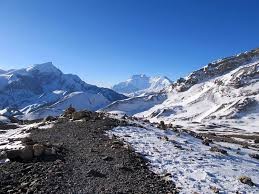
Mar 08 2020
We have been travelling with Trekking Team Group, and was a really great experience. We were 2 people to trek to Everest Base Camp, and communication before the trekking through email was very easy with quick answers to desing in flexible way what we wanted to do during our trip.
Once in Nepal Shreehari and Khrisna take care of all the things. They know very well where to eat, sleep during the trekking to have the best experience.
Very close and friendly people.
Totally recomended if you want to do this trek of others in Nepal.
Nov 06 2019
The staff are excellent! Drivers, porters, guides and management all strived to deliver a great experience that was delivered with sincerity and friendliness in true Nepalese fashion. I would highly recommend their excellent services to anyone considering travelling in Nepal.
This is ADVENTURE travel, and many of the trip destinations in this site are remote areas, within under developed countries, where events are less predictable than is usually the case in. The unexpected is the norm in these areas and, despite painstaking planning and organization, our adventure trips can never be taken for granted like regular trips. Many of the places that we visit do not have the same quality of emergency health and safety services that you are used to in the developed world. Internal flights can be canceled, road transport is generally uncomfortable and unreliable, and hotels often do not approach the standards of the West.
IF YOU ARE NOT PREPARED FOR THIS, YOU SHOULD NOT TRAVEL WITH US. This unpredictability also means that the itineraries that we put forward for each of our trips should be seen as statements of intent, rather than as contractual obligations. A variety of factors, including weather, transport difficulties and political instability, might dictate that we change any itinerary. The trip leader will make any changes that are necessary, after consultation with the group. Only rarely will such changes be significant, and we will always do everything within our powers to minimize the effects of the enforced changes. We cannot be held responsible for the results of changes or delays, irrespective of how they are caused.
Donation
Trekking Team Group donates one percentage of its total business profits to the foundation on yearly basis. The donated amount supports the ongoing maintenance of Gramin Devi School and Khumbeshwori School in Nuwakot.
Sponsorship
One of the major activities of Ambe Foundation is the children sponsorship programme. It is conducted in full collaboration with Trekking Team Group.
Partnership (Volunteering Program)
The Ambe Volunteer Programme, organised by Ambe Foundation and Trekking Team Group, aims to mobilise teams of experts and interested individuals effectively for education, health and community development in Nuwakot district.